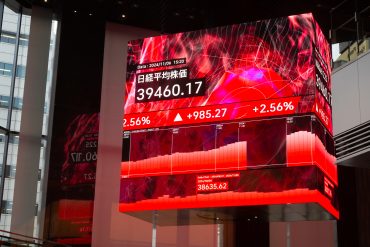
Japan's Nikkei Hits 40,800 as Tech Stocks Rally on Trade Optimism
5 minute read

Japanese tech stocks propel Nikkei to new highs as Asian markets rally amid improving U.S.-China trade outlook
Key Takeaways
- Japan’s Nikkei jumps 1.6% to 40,809, reaching its highest level since mid-July as semiconductor and tech stocks surge on U.S. trade deal optimism
- Asian markets post monthly gains exceeding 14% in South Korea’s KOSPI, with China’s indices climbing over 2% amid easing U.S.-China trade tensions
- SoftBank Group leads gains with 5% surge, while Tokyo Electron and Advantest rise nearly 3% each as tech sector benefits from tariff relief expectations
Introduction
Asian equity markets surge on Monday as investors embrace renewed optimism over U.S. trade negotiations and Middle East stability. Japan’s Nikkei 225 leads regional gains, climbing 1.6% to breach the psychologically significant 40,000 level for the first time since January.
The rally reflects broader risk appetite following Wall Street’s record-setting performance last week. Both the S&P 500 and Nasdaq closed at all-time highs, with futures extending gains during Asian trading hours as investors position for potential Federal Reserve rate cuts.
Key Developments
Japan’s benchmark index reaches 40,809.82 by midday, marking its fifth consecutive session of gains and highest level since July 17. The broader Topix rises 0.96% to 2,867.82, with 31 of 33 Tokyo Stock Exchange industry sub-indexes advancing.
Semiconductor-related stocks drive the momentum, with Tokyo Electron gaining 2.78% and Advantest climbing 2.88%. SoftBank Group emerges as the single largest contributor to Nikkei gains, jumping 5% as the startup investor benefits from renewed tech sector enthusiasm.
The precision machinery sector leads percentage gains at 2.21%, while medical equipment maker Olympus rebounds 6% after four consecutive sessions of declines. Industrial conglomerate Hitachi contributes significantly to Topix performance with a 2.4% increase.
Market Impact
Regional markets demonstrate mixed performance despite underlying monthly strength. China’s Shanghai Composite advances 0.3% while the CSI 300 gains 0.1%, with both indices positioned for over 2% monthly increases.
South Korea’s KOSPI rises 0.8%, heading toward a remarkable monthly gain exceeding 14%. Hong Kong’s Hang Seng declines 0.6% on Monday but maintains expectations for a 3.5% June advance.
Currency markets reflect shifting sentiment as the U.S. dollar strengthens to the upper 144 yen range. Japanese government bond yields rise 0.015 percentage points to 1.430% as investors rotate from safe-haven assets into equities.
Strategic Insights
The tech sector rally stems from expectations of reduced trade friction and tariff rollbacks on Chinese-made semiconductors. However, critical U.S. export controls on electronic design automation software and advanced materials remain intact, creating selective opportunities for equipment manufacturers.
According to Investing.com, U.S. semiconductor equipment companies including Applied Materials and Lam Research position to benefit from renewed Chinese demand for advanced manufacturing tools.
The automotive sector faces headwinds as U.S. President Trump criticizes Japan’s “unfair” automobile trade practices. Toyota and other major automakers decline 0.6% as investors weigh potential policy changes affecting the industry.
Expert Opinions and Data
Masahiro Ichikawa, Chief Market Strategist at Sumitomo Mitsui DS Asset Management, attributes Japanese stock gains primarily to semiconductor-related sector strength. The strategist emphasizes technology’s central role in current market dynamics.
Koichi Kurose, chief strategist at Resona Asset Management, expects limited downside corrections despite sharp gains. “Japanese stocks are still underperforming their global peers,” Kurose notes, highlighting potential for continued outperformance.
Kurose anticipates domestic spending growth toward year-end as falling oil prices and yen strength reduce utility costs. Recent factory data support this view, with China’s manufacturing sector contracting less severely than expected in June.
Masahiro Yamaguchi, head of investment research at SMBC Trust Bank, cautions that rapid gains may not reflect economic fundamentals. “The footing of the market remains unstable,” Yamaguchi warns, noting potential policy reversals.
Conclusion
Asian markets demonstrate resilience amid evolving trade dynamics and geopolitical developments. Technology stocks lead regional performance as investors anticipate reduced trade friction and continued artificial intelligence demand growth.
The convergence of Federal Reserve policy expectations, Middle East stability, and trade negotiations creates favorable conditions for risk assets. Market participants remain alert to policy developments that could reshape current optimistic sentiment across Asia-Pacific equity markets.








